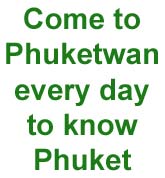PHUKET'S ''fake'' hotels have real guests, which is one of the reasons why Phuket's economy is a basket case. Efforts to tame outlaw operators are now intensifying, with the Thai Hotels Association gearing for a crackdown.
Do villas qualify as ''outlaw'' hotels? That's one of the questions many may well be asking, with ramifications for the property and real estate business, as well as tourism.
Tourists who once went to hotels now no longer check in at official resorts because they have new places to go on Phuket, places that aren't officially recorded.
The basket case economy is highlighted by THA figures that show international visitor numbers reaching forecasts over the past three years . . . as the occupancy rate of hotels slid by 20 percent a year.
The reason? As fast as the Tourism Authtority of Thailand campaigns attract travellers onto planes bound for Phuket and Thailand, developers keep building new accommodation. Some of it is fully approved, but much of it flits below the radar.
Like a gold rush, Phuket's steady tourist boom through crisis after crisis attracts plenty of players who want to get rich, if not today then tomorrow.
Methee Tanmanatragul, immediate past president of the Southern Chapter of the THA, told Phuketwan: ''There are so many places now on Phuket, 700 of them. And 61 percent do not have licences. A lot of them are operating as serviced apartments.''
Khun Methee says that calls for standard rates for resorts, hotels and guesthouses to prevent discounting are doomed to fail.
''Every time there is a crisis, there i a call for everyone to work together with set pricing,'' he said. ''But the minute people turn their backs, the discounting begins.''
That's the competitive nature of the tourism business. THA figures show that even average five-star occupancy rates in Thailand have slumped from 62 percent three years ago to 46 percent in the first seven months of this year.
The effect on Phuket is mirrored in Bangkok, where 299 hotels are officially registered, with a total of 58,820 rooms, while there are also 169 indirect operators with more than 48,000 rooms.
What it means is a constant state of catch-up - and a lessening of standards. This inevitably combines with other negatives, including the rising baht and the tuk-tuk rip-offs, to discourage tourists from coming back on a regular basis.
''Twenty years ago, Phuket had a seven-month high season,'' Khun Methee said. ''Today there's a three-month high season, with shoulders on either side. That's all because of the oversupply of accommodation.
''If you look at Singapore and Hong Kong, the occupancy rates there are 85 percent. That's because expansion is sensibly controlled.''
When Phuketwan suggested that Phuket needed a person like Singapore founder Lee Kwan Yew to sort out its lawless aspects in tourism and other areas, Khun Methee responded: ''Phuket needs more than one Lee Kwan Yew. We could use a few.''




Thai Hotels Association complaint to TAT and Thai government agencies is legitimate but many other businesses in tourism businesses would be happy that a crackdown is done against all illegal businesses in Phuket, which is a wild lawless province.
In the diving industry in Phuket,they are more than 500 registered diving companies but less that 20 of them operated diving boats and are employing Thai people at all level of management.
Most of the other diving companies are set up by foreign instructors with proxy shareholders and Thai directors in order to get issue work-permits to work as freelance Instructors without employing four Thai people per work-permit.
Posted by Whistle-Blower on October 6, 2010 11:51